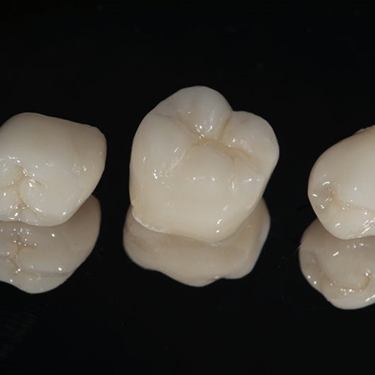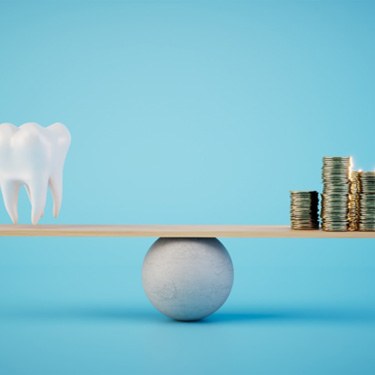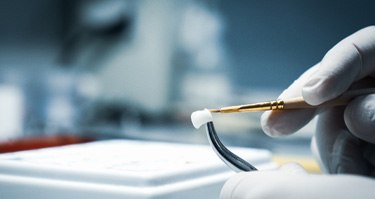Dental Crowns – Schenectady, NY
We Can Give Your Tooth the Royal Treatment
The crowns of your teeth, which are the portions that are visible when you smile, are subjected to an onslaught of attacks every day. From withstanding the wear and tear of chewing to defending the sensitive part of your tooth against acid attacks from bacteria, these pressures can eventually damage the crown, leading to a broken or decayed tooth. If this has happened to you, we can give your tooth the royal treatment by placing a dental crown. If you have a cavity or broken tooth, let Dr. Steven Oshins repair it with this custom-made restoration.
Why Choose Oshins of Smiles for Dental Crowns?
- Custom-Made Restorations for Each Patient
- New State-of-the-Art Dental Office
- Can Last 10+ Years with Proper Care
What Are Dental Crowns?

A dental crown is a tooth-shaped restoration that slips over a tooth like a cap to protect it from further damage. We offer crowns made of durable metal as well as incredibly lifelike dental porcelain, depending on your individual smile needs.
Receiving a crown generally takes two appointments after your initial consultation. During the first of these visits, we’ll prepare your tooth by shaving off a super-thin layer of enamel. This step ensures the crown won’t bulge out in the line of your smile. Then, we take detailed impressions of your tooth, sending the data off to our partnered dental lab. Until your crown is ready, we can affix you with a temporary restoration to protect your tooth. A few weeks later, you’ll return to our office, where we’ll replace your temporary crown with your permanent one.
Am I a Good Candidate for a Dental Crown?

If you suffer from any of the following dental problems, you might be an ideal candidate for a dental crown:
- Advanced tooth decay
- Moderate to severe tooth erosion
- A cracked or chipped tooth
- A misshapen tooth
- Severe tooth discoloration or staining on a tooth
- A root canal infection
Benefits of Dental Crowns

Restoring your tooth with a dental crown offers many advantages. For one, your tooth’s functionality will be restored to the same level it had before decay or injury took hold. You should be able to chew just like you used to without discomfort. Each crown is custom-made to blend in with the rest of your smile, so onlookers shouldn’t even be able to tell it’s not your natural tooth!
Tips for Maintaining Your New Crown

Once your dental crown has been placed, you should essentially treat it like a normal tooth. This entails avoiding activities that could damage your natural pearly whites, like opening packages or holding bags with your teeth, eating ice, or biting your fingernails. You should also brush and floss around your crown every day and visit Dr. Oshins for a checkup on a regular basis. These appointments, as well as proper at-home oral hygiene, prevent bacteria from accumulating underneath your crown and resulting in crown failure. Following these tips will increase the likelihood that your crown lasts for more than a decade before it needs to be replaced.
Do you have a severe cavity or a broken tooth you wish were whole? Contact us today and ask about dental crowns. It may be just the thing your smile needs!
Understanding the Cost of Dental Crowns

Before you commit, you likely want to know your crown’s price. That’s only natural – treatment is pointless if you can’t afford it. That said, the cost of dental crowns varies by patient. You’ll want to consult Dr. Oshins for an exact estimate. From there, we can make your crown(s) as affordable as possible. Our team will even explain their cost factors and payment options. For more details, just keep reading or call our office today.
Factors That Affect the Cost of Dental Crowns

Before treatment, Dr. Oshins will conduct an oral exam. This step lets him learn the factors that affect your crown’s price. Usually, these elements include:
- Tooth Damage – As dental damage increases, so does the cost of crown work. Mild chips may mean you only need the cap itself. Meanwhile, a greatly broken tooth will require a crown and preliminary work. Getting these extra services will raise your expenses.
- Crown Material – Treatment price is also impacted by crown material. You see, one made from metal is usually cheap. In contrast, ceramic crowns will cost more.
- Crown Processing – If a crown is milled traditionally, it’ll be less expensive. However, processing it with CEREC same-day technology is pricey.
Aside from these factors, don’t forget that cheap crowns aren’t ideal. They’re only low-cost due to their bad materials and milling methods. As such, it’s better to get a more decently-priced crown. Your expenses may rise a bit, but the cap will work better!
Does Dental Insurance Cover Dental Crowns?

In most cases, dental insurance will cover dental crowns. It views these dental caps as necessary and protective. Given that fact, many plans cover up to 50% of a crown’s price.
Of course, there are some exceptions to the rule. Some dental plans won’t cover crowns at all. On the other hand, others only provide limited coverage. For these reasons, confirm your benefits beforehand. Our team members can help you if needed.
Other Options for Making Dental Crowns Affordable

Luckily, insurance isn’t the only way to make crowns affordable. Most practices now offer a range of helpful payment options. With the right one, your future crown can easily become budget-friendly.
For example, look at Oshins of Smiles. Our office works with CareCredit – a reputable, third-party financier. Through them, you could pay for a crown in monthly installments. That means you could cover the treatment cost over a longer period.
Ultimately, our practice wants your crown to be pretty, effective, and affordable. To make that possible, book a consultation with us – you’ll be glad you did!
Dental Crowns FAQs
What Are Dental Crowns Made Of?
Several different materials can be used to create your dental crown. Dr. Oshins offers two different types, outlined below:
- Metal. Historically, restorations like dental crowns were made of metal. Tried-and-true options like gold, silver, nickel, and chromium have all been used successfully. Although metal is incredibly durable, it doesn’t bond with enamel. Plus, it expands and contracts with temperature changes in your mouth, which can cause additional injury. As a result, it’s not always the preferred method.
- Thanks to advancements in dental technology and techniques, today, you can have an artificial tooth made of ceramic that can last for 15+ years. On top of that, this material can be customized to match your natural teeth for a seamless smile.
Are Dental Crowns Permanent?
In one sense, your prosthetic is considered ‘permanent’ because it’s a non-removable solution bonded in place. Furthermore, our team must remove a small amount of enamel from your tooth to fit correctly. This protective outer layer doesn’t regenerate, so it’s an irreversible change. Your tooth will require a dental crown or some other restoration in perpetuity to prevent additional injury.
However, it may eventually need to be repaired or replaced, so it’s not considered an everlasting solution. You can keep it in good health longer by brushing and flossing your teeth twice daily and visiting our office for a routine checkup and professional cleaning every 6 months.
How Do You Know When a Dental Crown Needs to Be Replaced?
Although they’re quite resilient, your artificial tooth likely won’t last forever. Some signs that it’s time to get a new one can include:
- If you have sensitivity or inflammation in or around your treated tooth, it could point to an underlying cavity or other problem that requires professional intervention. We’ll need to remove your dental crown to treat the tooth beneath and then fit you with a new one.
- A loose or wiggling restoration, especially when eating anything particularly sticky, warrants a call to our office.
- Visibly noticeable wear and tear. A chipped, worn down, or stained prosthetic can dent your self-confidence, but replacing it can boost your self-esteem.
If you’re still uncertain whether your prosthetic is nearing the end of its lifespan, the best way to find out is to schedule an appointment.
Does It Hurt to Get a Dental Crown?
Our team will numb the area with a topical anesthetic before placing your restoration so you will likely not feel discomfort during the procedure. After your appointment, it’s normal to develop some sensitivity for a few days, especially if your circumstances require a root canal. Addressing any aches and inflammation with over-the-counter medications like ibuprofen or Tylenol is usually perfectly safe. That said, if your pain worsens or doesn’t subside after that, please call us to let us know. We may need to see you again to ensure your dental crown fits properly and hasn’t sustained any damage.
I Need a Checkup & Cleaning I am Looking for a Dentist for My Child I am Concerned About Bleeding Gums I am Concerned About Sleep Apnea I Have a Cavity or Broken Tooth I am Missing One or More Teeth I am Unhappy with My Smile I Want a Straighter Smile I am in Pain & Need Help View Our Services
